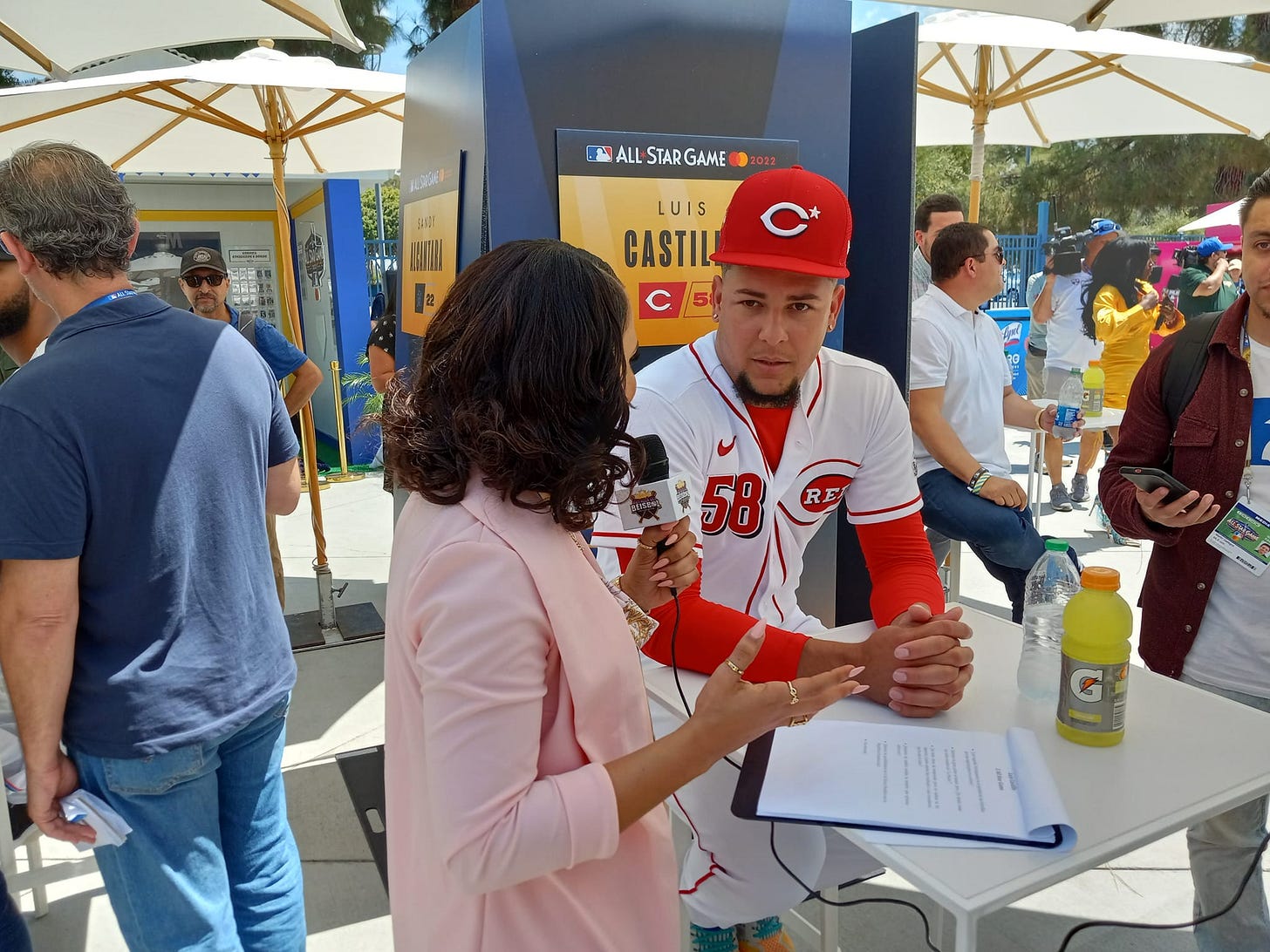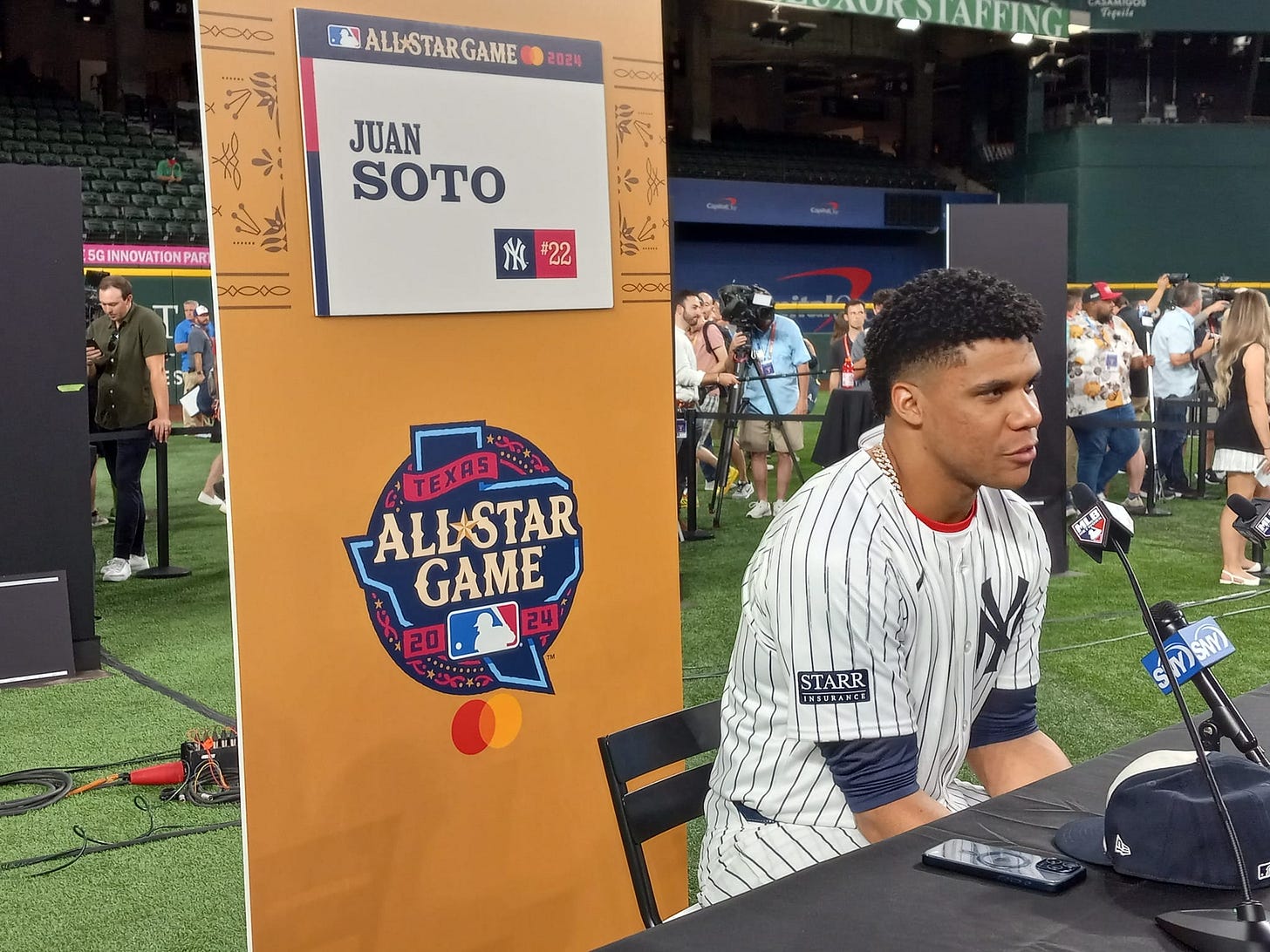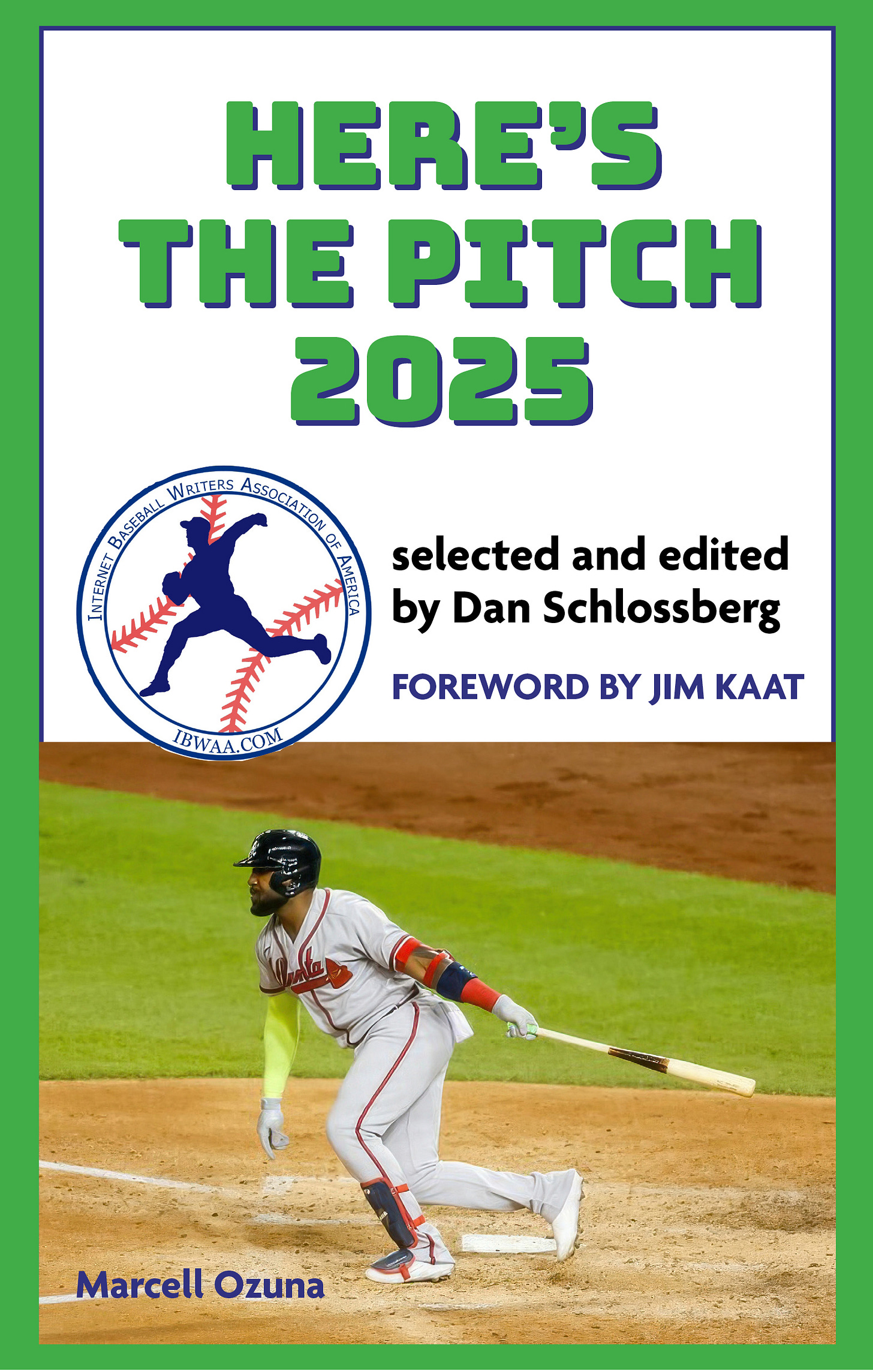Rising Tigers Contemplate Future Moves
ALSO: FREE AGENT FRENZY MAKES 2006 WORK STOPPAGE PROBABLE
IBWAA members love to write about baseball. So much so, we've decided to create our own newsletter about it! Subscribe to Here's the Pitch to expand your love of baseball, discover new voices, and support independent writing. Original content six days a week, straight to your inbox and straight from the hearts of baseball fans.
GREAT HOLIDAY BASEBALL GIFT !!
HERE’S THE PITCH 2025
Selected and edited by Dan Schlossberg
(215 pp, $24.95)
This first annual collection of 35 great baseball stories, analysis, memories, and trivia for the baseball fanatics on your gift list (including you) is available now for $24.95 at
http://www.actasports.com
But subscribers to this newsletter get 10% off on one copy or 20% off on two or more copies by calling 800-397-2282, talking to a real live person (not an AI robot), and ordering directly from the publisher. Offer good only through December 31, 2024!
Pregame Pepper
Did you know…
Even though Shohei Ohtani has started throwing again, early reports suggest he won’t be ready to pitch when the 2025 season opens in his native Japan against the Cubs on March 18 . . .
It doesn’t help that the Dodgers are opening nearly two weeks ahead of everyone else, with Yoshinobu Yamamato likely to get the nod over newly-signed Blake Snell . . .
Chicago’s probable starter will be another Japanese ex pat, Shōta Imanaga . . .
According to Ronald Blum of The Associated Press, the Dodgers now have $1B in deferred money owed to seven players from 2028-46 . . .
It’s not every day that someone with three straight batting titles reaches an impasse in salary talks with his team but that’s the situation facing San Diego’s Luis Arraez, a poor defensive infielder and punchless hitter . . .
The Padres will miss switch-hitting outfielder Jurickson Profar, the steal of the year from last year’s free agent market at $1 million but a free agent this winter.
Leading Off
Detroit Tigers: Free Agent Signing or Trade Winds in the future?
By Joe Underhill
The Winter Meetings have been exciting for baseball. The echo’s of Juan Soto’s record-breaking contract are still being felt, but for teams like the Detroit Tigers, chasing the likes of Soto on the free agent market is just not plausible. The Tigers have made one signing, agreeing to a deal with veteran right-handed pitcher Alex Cobb on a one-year pact that will pay him $15 million plus incentives for innings pitched.
In talking with beat reporters after making the deal official, team President Scott Harris and GM Jeff Greenberg laid out three ways the club could improve, via signing a free agent (like Cobb), through a trade, or through internal improvements. The duo said they don’t see any path as preferable or mutually exclusive. The goal, as Harris said, “trying to build a window in which we are a mainstay in October.”
Based on the off-season priority list Harris presented at his end-of-season presser, the Tigers are still looking for a right-handed bat, and probably a bullpen arm who can generate swing-and-miss while also leaving open the possibility of adding another starter.
The Tigers are probably unlikely to shop in the expensive free-agent aisle. Mostly, because as Greenberg and Harris noted, the Tigers have two more waves of prospects they feel “really good” about. The team made a shocking run to the post-season by playing those young players, and so the Tigers are likely to continue emphasizing that model. That leaves trades as the most likely avenue to adding talent to the roster.
Trades are always fun to dream about unless you are the guy being traded and having your life turned upside down or the GM hoping he isn’t known as the guy who traded a future Hall of Famer — for what?
The Tigers have been on both sides of that conundrum. Thank you for Miguel Cabrera and sorry Jake Rogers, but what exactly did we get for Justin Verlander? Here are three 1,000 per cent hypothetical trades that would improve the Tigers’ chances in 2025.
Deal 1: Detroit and Seattle complete a blockbuster!
Detroit receives: Luis Castillo and Logan Evens
Seattle receives: Spencer Torkelson, Matt Manning, Jace Jung and Max Anderson, plus international bonus money.

Why does Detroit make this deal? What is better than having one ace? Having two obviously. Castillo is cost-controlled through 2027 with a vesting option in 2028. The Tigers have young arms they are very excited about and the last run of playoff appearances were headed by a pitching staff featuring Justin Verlander, Max Scherzer, David Price.
Elite pitching is worth it. The Tigers would need to figure out how to replace Tork, maybe with a Paul Goldschmidt or Carlos Santana signing to bridge the gap. They are also having Justyn-Henry Malloy take first-base reps in spring training, along with Colt Keith, so they have options.
Why does Seattle do this? First, Detroit is willing to take Castillo’s whole salary. Seattle has pitching depth and could make a run at Roki Sasaki with the added pool money, but with the unknown regarding the regional sports networks, ownership has hesitated to spend, so this would free up a fair amount of money for the team.
They are gambling that new hitting coach Edgar Martinez is going to be able to unlock a better version of the 2023 Tork who hit 30 home runs. They would also be taking a gamble on Manning being able to take the next step. Lastly, while Jung didn’t show his power in his call up to the Majors last season he has a track record of being an above-average hitter and won a minor-league gold glove at second base. Ultimately the deal would give the Mariners two upside bats, a major-league arm and salary relief.
Deal 2: Tigers add veteran hitter in deal with Rays
Detroit receives: Yandy Diaz and international bonus money.
Tampa Bay receives: Matt Manning, Alex Lange and Troy Melton.
Why does Detroit do this deal? Diaz would give the Tigers a solid contact hitter with some power from the right side. Diaz is a career .288 and offers some positional flexibility although he’s a below-average defender. He’s under team control for two more years at $7.7 million and $10 million, so he wouldn’t break the bank. The Tigers could try to add international bonus money to either go after Roki Sasaki or another international player or players who become available in the Sasaki fallout.
Why do the Rays make this trade? Because they are the Rays and whatever combo of players they would ask for they would probably get the most out of them. The Rays are the original pitcher whisperers and do a great job of helping pitchers better command their stuff. Both Manning (needs a third pitch) and Lange (needs command) have areas in their game that are holding them back. Melton pitched well in 2023 and struggled in 2024, so he’s probably a middle-of-the-rotation starter or possibly a leverage bullpen piece, depending on how he develops.
Deal 3: Detroit, St. Louis and Philadelphia land third basemen new homes.
Detroit receives: Alex Bohm (Phil), Travis Honeyman (St. Louis).
St. Louis receives: Justyn-Henry Malloy (Det), Jace Jung (Det), Bryan Rincon (Phil).
Philadelphia receives: Nolan Arenado (St. Louis), Matt Manning (Det), Hao-Yu Lee (Det)
Why does Detroit make this deal? Honestly, I really don’t know why the Phils would want to move Bohm. Maybe there is clubhouse stuff — who knows? — but the Tigers would be getting a right-handed hitter who has posted OPS+ above 100 the past three seasons and is under team control for another three years.
Why does St. Louis make this deal? They add a lot of talent to their system and players who are at or close to being ready to compete at the major-league level. Jung needs to improve defensively, but he could start at the hot corner and was a Gold Glove winner in the minors. J-Hen might need to be a DH/1B but he has elite plate discipline and has shown more in game power than any of the Cardinals’ outfielders.
Why does Philadelphia make this deal? Because Dave Dombrowski likes stars and Nolan Arenado is a star. Manning could be a back-end starter or move to the bullpen where his stuff would play up. He also reacquires Lee, who looks to be about ready to crack the majors.
Joe Underhill is a high school administrator and diehard baseball fan and fan of the city of Detroit. Joe currently writes for the HTP Newsletter. You can follow Joe on Twitter@TransplantedDet and @transplanteddet.bsky.social. His email is joe.underhill@auburn.org.
Cleaning Up
WARNING: Soto’s Salary Makes 2026 Shutdown Likely
By Dan Schlossberg
The Juan Soto signing makes it even more likely that baseball will face yet another work stoppage when the existing six-year Basic Agreement expires after the 2026 campaign.
As usual, greed will be the driving force behind that development.
Because everyone knows everybody else’s salary — pure poison in the civilian world — the fiscal demands of every remaining free agent jumped into the stratosphere after Steve Cohen and Hal Steinbrenner conducted the frenzied bidding war that kept Juan Soto in New York.
The cost was $765 million and 15 years — a deal that will take him through his age-41 season. With incentives and escalators included, the contract could be worth more than $800 million — more than double any club’s total payroll.

When salaries were getting out of hand when the last Basic Agreement expired, owners locked out players for four months. It started just before the 2021 winter meetings, which were cancelled — along with all labor-management negotiations.
It was baseball’s second nuclear winter, following the 1994-95 player strike that wiped out the World Series, winter meetings, and part of the spring training schedule while forcing changes in the regular-season schedule (reduced to 144 games).
Mets fans who are gloating now will be crying in their beer in two short years.
But there’s no clause in Soto’s contract — or anyone else’s — that says he won’t get paid in the event of a catastrophic labor impasse that shuts down the game.
There should be.
Officially, the basic agreement expires on Dec. 1, 2026. So don’t book flights, rental cars, or hotels for the 2026 winter meetings, 2027 spring training, or any time in the 2027 regular season.
The looming lockout, which could be preempted by a late-summer player strike, will make the 232-day lockout look like a walk in the park. And this time, there won’t be any Supreme Court justice sympathetic enough or sensitive enough to stop it.
Sonia Sotomayor is the one who should be in the Hall of Fame instead of Marvin Miller.
In the meantime, the owners are fiddling while their sport is burning.
With the minimum salary rising to $760,000 next year and $780,000 in 2026, small-market teams not only can’t compete but might go bankrupt, forcing Major League Baseball into a contraction that would shake the sports world to its core.
We’re looking at you, Tampa Bay Rays and Pittsburgh Pirates, and also at you, Kansas City Royals, Milwaukee Brewers, Minnesota Twins, and Colorado Rockies. Not to mention the Athletics, who don’t even have a city ID or a major-league ballpark prior to their 2028 move to Las Vegas.
With the mother of all sports labor disputes looming, the Commissioner of Baseball seems more concerned with peddling putrid ideas like the “golden” at-bat.
Seriously?
Here’s The Pitch weekend editor Dan Schlossberg of Fair Lawn, NJ grew up during The Good Old Days, when two eight-team leagues sent champions directly to the World Series and there was no post-season tournament, no designated hitter, no wild-card winners, no artificial surfaces, no domed ballparks, no World Series night games, no six-figure salaries, and no free agency. There were also no work stoppages. Dan’s email is ballauthor@gmail.com.
Timeless Trivia: More Thoughts On Dick Allen
Newly-minted Hall of Famer Dick Allen once demeaned AstroTurf, saying “If a horse won’t eat it, I won’t play on it” . . .
He wouldn’t play in Atlanta either, refusing to report after the White Sox traded him to the Braves during the 1974 winter meetings because of perceived racism — even though Hank Aaron had completed his Hall of Fame career in the same city three months earlier . . .
The Braves, unable to change Allen’s mind, sent him back to Philadelphia for three players the following May 5 . . .
During Allen’s first season, with the ill-fated 1964 Phillies, Allen hit .318 with 29 home runs and 91 RBIs in 162 games but was out-hit by fellow rookie Rico Carty, who hit .330 with 22 homers and 88 RBIs in 133 games for the Braves . . .
Neither Allen, who played third base then, nor Carty, an iron-gloved left-fielder who later became one of the early designated hitters, won raves with their gloves.
Know Your Editors
HERE’S THE PITCH is published daily except Sundays and holidays. Benjamin Chase [gopherben@gmail.com] handles Monday and Tuesday editions, Elizabeth Muratore [nymfan97@gmail.com] does Wednesday and Thursday, and Dan Schlossberg [ballauthor@gmail.com] edits the weekend editions on Friday and Saturday. Readers are encouraged to contribute comments, articles, and letters to the editor. HTP reserves the right to edit for brevity, clarity, and good taste.




